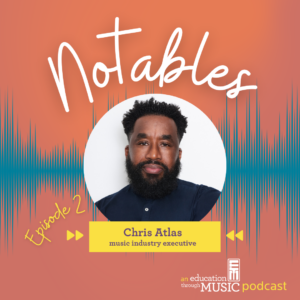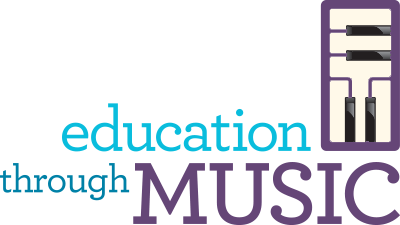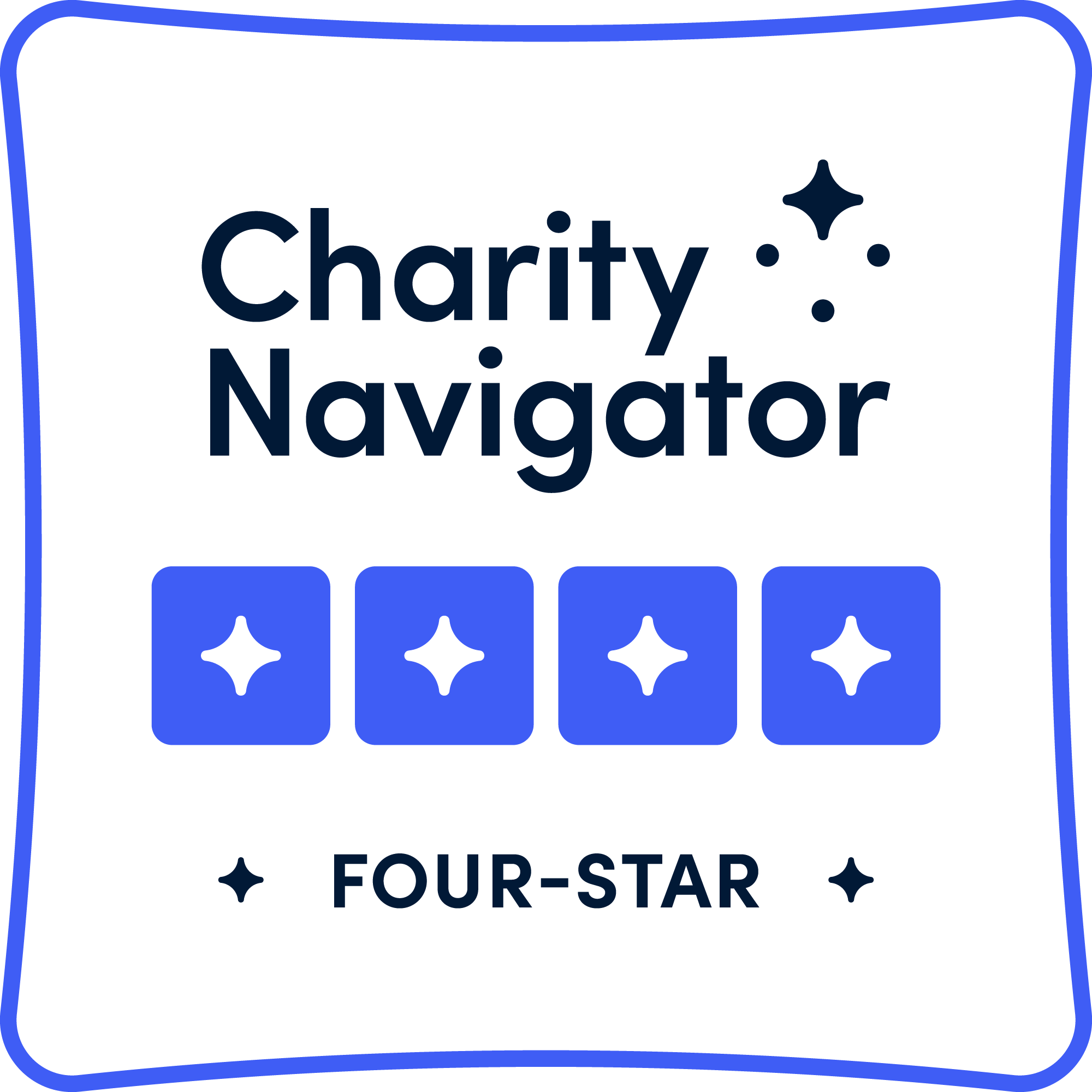Notables, an ETM Podcast - Episode 2: Chris Atlas

Notables – EPISODE 2: chris atlas
In our newest podcast series, Notables, ETM Instructional Supervisor Noah Teachey sits down with leaders in the music, technology, finance, and related industries to learn about the influential role that music has played in their lives. For our second episode, Noah speaks with music industry executive, Chris Atlas, as he shares how his musical childhood in the Bronx influenced his career choices, bringing him first to Tommy Boy Records, where he worked with the likes of De La Soul, all the way to serving as an Executive Vice President at Warner Records.
Available on the podcast platforms below!
Listen to “Education Through Music: The Podcast” on Spreaker.
Click your preferred platform below to listen and subscribe today!
Transcript
Chris Atlas: It’s about the consistency of what you’re doing, and you could have success. But you also have to understand that that success might not be instantaneous. And you have to have the patience, the discipline, the fortitude, but also the drive to stick with it.
Noah Teachey: You are listening to Notables, an Education Through Music podcast. As always, I’m your host, Noah, and my guest today is Chris Atlas, who is the Executive Vice President of East Coast Operations and Urban Music. At Warner Records. Hey, Chris. Thanks for meeting me today.
Chris Atlas: I’m excited to be here. Good to meet you.
Noah Teachey: Good to meet you. To kick things off here, how did you first get involved in music.
Chris Atlas: I’ve always been interested and involved in music. In school, it started, in you know, the playground, the cafeteria, doing the beatbox, banging on the cafeteria table, you know, rap was a big part of my scene when I was coming up as a young kid. Music was always played in my house, my dad, who is actually a Baptist minister, would always sing, you know, in the house, and, you know, we would go to church, and you know, I would sing in the choir, and so music was always in and around my house. As I continued to grow up, I started DJing. I had my stint when I, you know, tried to be an artist and a performer but music always was in my life, you know. And it was always a part of who I thought I wanted to be. When I went on to high school, continued to DJ, continued to, you know, work on my group, and also I even had a stint as a producer where a partner and I, we actually had a production duo and we would produce tracks, you know. Not only for ourselves, but other local artists in the Bronx because, you know, I’m a kid from the Bronx as well. So again, music, giving one, my background, given my interest, it was always present in my life and in my house. And as I continue to aspire and pursue my education, that’s where I actually got on the professional, you know, path, and decided to go on to the business side of music and entertainment.
Noah Teachey: We’re in CS 55 right now, which is a school in the South Bronx. We’re, I think, probably about a thirty to forty minute Bronx 41 bus ride from where you grew up in the Gun Hill area. Yep. So I’m interested to know about how or if your school music experiences had any impact on your sort of extra curricular music experiences with the DJing and the producing that you got into before the business side of things.
Chris Atlas: Yeah. Well, you know, music in school. I actually went to Saint Philips and James, which is a Catholic school on Boston Road in the Bronx. Mhmm. So music, we had our music class. We actually would sing in the services that would actually happen, you know, at the school. So music was present.
But I think a lot of my career and music aspirations stemmed, you know, outside of school and particularly the time that I was a kid, which is a long time ago. I’m not gonna say how long. But it was a long time ago. I think the music programs and music and education has really evolved in a tremendous and incredible way. But I think the music class that we had and singing and school actually was a great outlet in terms of just, you know, kinda channeling that creative energy and spirit that I think I had as a kid.
Noah Teachey: So maybe if it wasn’t directly impacting the way that you were working with music, it was sort of there in the background. When you started working with the tools that were more interesting to you.
Chris Atlas: Yeah. Absolutely. That makes sense. Yeah.
Noah Teachey: You ended up going to school for business at Penn State. So what led you in that direction as opposed to a more music aligned direction at the start of your sort of post secondary?
Chris Atlas: Absolutely. Well, you know, at that time when, you know, I first graduated high school, went to college, I went the business route because I wasn’t clear on the professional aspect that I could work within music and entertainment, to be quite honest. And there weren’t as many music driven programs, particularly in higher learning and higher education as they are now. So for me, going the business administration route was, you know, one, I knew I wanted to go to college. I knew it was important to have a college, you know, degree in terms of career aspirations that I had, wanted to please my parents You know? I was a good student. I was always a good student. I was on the honor roll. So you know, college I felt was actually a great path for me, which is why I did, you know, the two and a half years and got my associates and business administrations.
But while I was, you know, at Penn State, and actually maturing and growing up, it actually started to open my eyes to the fact that I can have a career in entertainment and whether that was music, whether that was marketing, whether that was communications, I started to meet people. I started to make connections. You know, at that point, you know, I’m eighteen, nineteen. I’m a young adult and I’m starting to move around and build my network. So, and moving around and building my network, that actually opened me up to a new opportunity to meet people and see it, well, hey, there’s this other path that I could do that’s connected to music that is within entertainment. And it allowed me to pivot, you know, and make that transition to get, you know, on the music and entertainment path, which I’ve been on for the last twenty five plus years.
Noah Teachey: This idea of there being so many different ways of engaging with music is so important for students to hear about, as I mean, everybody, but especially students because I think there’s this sort of common understanding that engagement with music is for this very narrow group of people, and that’s it. And then everybody else is just listening. But there are these other ways of getting involved in getting locked in with the music community that can also be career possibilities for students. So I think this this aspect of your story is really interesting to me and I think really relevant to young people.
Chris Atlas: Yeah. I mean, there’s so many aspects of music and entertainment that young people can be involved in behind the scenes from business affairs and legal to finance where no one ever talks about finance. No one ever talks about, you know, math and music and entertainment. But yeah, like, you know, it’s a business. And I think the commonality of everyone that works at a label whether they’re in the finance department or the A&R department, which signs the talent, we have a love of music. We have a love of music and entertainment. And and it’s great to have that understanding that, wow, if I love music, but I also, you know, might love tech and web development. I could still potentially work at, you know, a record label or an entertainment company or a streaming service because all of these different departments and all of these different people behind the scenes makeup for the artists and the shows and the videos and everything that you see that’s in front of the camera.
Noah Teachey: And now for a short break, This podcast is brought to you by Education Through Music. ETM is a nonprofit organization that partners with under-resourced schools to provide music as a core subject for all children and utilizes music education as a catalyst to improve overall achievement, motivation, and self confidence amongst students. To learn more or support the work of education through music, check out ETMonline.org.
So you you were at Tommy Boy Records from ‘96 to 2001.
Chris Atlas: Mhmm. And, yeah, ‘95. Ninety five. Because I started as an intern in ‘95.
Noah Teachey: And so you were you still at Penn State at that point or had
Chris Atlas: I was at City College. I was at City College. Yeah. When I started at Tommy Boy, I was I think it was my last year. You know, I was my senior year at City College and interesting story about that. I was, like, most, you know, young college students, you know, broke. I was living at home. I just applied for a job. And I remember this day kind of vividly, I had applied for a job at Cablevision, which was in the Bronx. And, you know, because I had to get a job. I got the job. Right? I got hired. And then the next day, I got a call that I got accepted for this internship at Tommy Boy. And it was like, I just got this job, you know, I needed the job. Right? Am I gonna take the job or do this internship? Because I couldn’t do both. Just based on the job was a full time job, the internship, you know, granted I was still in school. And the internship, it was several hours that I needed to be available. And I took the internship. That changed my life.
Noah Teachey: When I think of an internship, especially, you know, senior year of college or just out of college, I don’t think of necessarily an executive track. So I’m wondering how your musical experiences as a young adult, you know, high school, college impacted that trajectory, if at all.
Chris Atlas: I think just my early exposure to music, whether it was in school or around school or just with my friends and it just kinda shaped how music has and and remains a part of who I am and my personal and professional life. As long as I’ve been in this business, I still don’t take it for granted because I realized that it’s a great opportunity to work within music, to be a part of music, to work with and break some of the artists that I’ve been involved with, and it’s competitive. You have to stay passionate, you have to stay urgent, you have to, you know, stay appreciative, because, you know, it’s not for everyone.
Noah Teachey: Some of the artists you’ve worked with, everybody in the audience will recognize. I wonder if there are some particular artists who sort of come to mind most immediately as having interesting stories or the way that your relationship was fruitful and getting them sort of out into people’s ears.
Chris Atlas: I mean, I’ve worked with so many great artists through the various phases of my career. De La Soul, for example, when I started my career at Tommy Boy, was a dream to actually work with them because they were and still are, actually, one of my favorite groups of all time. But as you can imagine, you know, as a young young kid starting to work with this group who I idolized, you know, and going on the road with them and doing promo with them to actually years later, being friends, you know. They had a tremendous impact in terms of my approach to building a bond and a connection with artists to when, you know, my stint at Def Jam, which Def Jam is definitely one of the most historic labels in hip hop and music. And, you know, working with artists like Rick Ross and Young Jeezy and Kanye West and what was important about each of those acts was their commitment to their art and their craft, you know, and their drive. To the great artists that we’re building at Warner and working with Saweetie and NLE Choppa and Dua Lipa and Bebe Rexha just to name a few. Yeah. I think each of these artists, they have that commonality of drive, talent, hustle, which is always important. And then, of course, surrounding themselves with the right people that can help amplify and understand the vision that they have. And, you know, I think that’s always been my approach to just having consistency with the artist and building credibility with the artist, but integrity in my approach and I think what the team that I’m usually involved in our approach to, again, how we support the art, and how we support their music and their, you know, their careers just as we’re supporting ours.
Noah Teachey: If you could talk to an audience of music teachers about what music programming needs in schools in order for young people to come out ready to be a part of this experience with artists to develop their craft and to develop their product and make it accessible to a huge audience. What would you tell them about those about the trajectory of that programming?
Chris Atlas: There’s a number of things I would tell them. I think that whether you’re an artist, singer, you play an instrument, or you’re behind the scenes. I think there’s still the same level of discipline that’s needed. I think there’s that level of focus in terms of being the best and understanding the craft, there’s a tremendous amount of patience that’s needed. And I say that particularly for today’s generation because we are in an instant gratification generation. Right? Everything is instant now, now, now, I want to be a star overnight or I want to be an EVP overnight or I want to teach a class overnight, where I think there’s a level of patience that needs to be understood in terms of learning the craft, learning how you can grow and develop within it and gaining that experience that, to me, I feel so much more rewarded having achieved tremendous things over a long amount of time versus a short amount of time. So I think that those fundamentals are important not only just on the artist community side of music, but the professional side of music.
Noah Teachey: That’ll resonate with a lot of people because the music is something that just takes a long time to develop and if you’re gonna do it the right way, I think.
Chris Atlas: Yeah. I mean, listen, I talk to a number of the artists that I work with still in terms of it’s not gonna happen overnight. Like, it could. Don’t get me wrong. And there’s definitely examples and stories where you know, there’s instant overnight hits. It happens. But those, you know, are the unicorns in the space. You know. And for everyone else, it’s about the consistency of what you’re doing and what you wanna do. And you could have success. But you also have to understand that that success might not be instantaneous. And you have to have the patience to discipline, the fortitude, but also the drive to stick with it.
Noah Teachey: Chris, thanks so much for your time and for your inspiring story and for bringing this insight to the listener.
Chris Atlas: Thank you. Thanks for the time and always excited to share some information and hopefully, it helps.
Noah Teachey: Is there anybody you can think of who might wanna talk to us?
Chris Atlas: Kevin Liles, who is the CEO of 300 Entertainment. He’s been a big brother to so many, including myself. I think he would be great, and his insights and expertise would be tremendously valuable, and I think he would do it.
CLICK HERE TO LISTEN to MORE FROM ETM!







